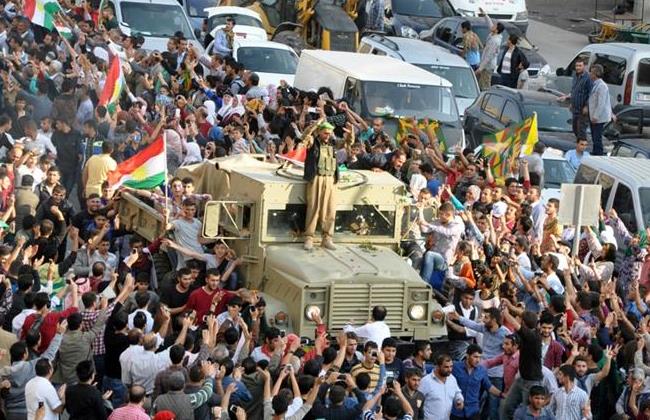Hezbollah’s response will reveal much about its multiple roles
Rami G. Khouri/The Daily Star/Jan. 21, 2015
The Israeli attack Sunday in the Syrian Golan Heights that killed Hezbollah and Iranian officials has understandably generated much speculation primarily about whether, when and how Hezbollah will retaliate against Israeli targets. The easy answer is that, of course Hezbollah will respond in some manner that it deems appropriate, but this is really not the most significant aspect of what happened. That label must go to two related phenomena: the tangled dynamics of Hezbollah’s relations inside Lebanon and around the Middle East, and the fact that the Israeli attack in Syria – an almost routine event, sadly – actually hit three targets in one, namely Hezbollah, Syria and Iran. How those three members of the resistance and deterrence front will or can retaliate against Israel strikes me as the significant issue here. That is because it can clarify the consequences of Hezbollah’s role in Lebanese politics and in the resistance and deterrence front in the wider Middle East.
Years ago, Hezbollah was a simpler actor, defined mainly by its two most successful legacies: military resistance to Israel, and the mobilization and lifting up the Lebanese Shiite community from the bottom of Lebanese society to dominance of the national governance system (even though that dominance usually played out behind the scenes and took the form of blocking decisions the party disliked, until outcomes were reached that it liked). Today, Hezbollah is a different and more complex actor. This reflects new, or merely more explicit, elements of the party’s basic dimensions: its active warfare and military deterrence against Israel; its fighting in Syria to maintain the Assad regime; its fighting against takfiri militants such as Nusra Front inside Lebanon; its continued structural and strategic links with Iran; and its dialogue with the Future Movement in Lebanon to reduce domestic polarization and reconstitute a legitimate governance system with a functioning parliament and presidency.
At the turn of the century, Hezbollah was widely acclaimed in much of Lebanon and the region for leading the battle to liberate south Lebanon from Israeli occupation. With every post-2000 military engagement with Israel that caused great destruction and human dislocation inside Lebanon, Hezbollah’s luster has dimmed a bit. Today the very polarized Lebanese see the party either as the nation’s savior and protector, or as a dangerous Iranian Trojan horse. The latter argue that Hezbollah is an instrument of Iranian foreign policy that ridicules Lebanese sovereignty and endangers all Lebanese by keeping them hostage to open-ended conflict with Israel that serves Iranian strategic interests. That argument about whether Hezbollah serves Lebanese or Iranian interests has gone on for years and remains inconclusive.
Hezbollah’s active military and intelligence work in the northeast of Lebanon and its cooperation with the revived and strengthened Lebanese Armed Forces is a new dimension of its actions and priorities, one which most Lebanese are grateful for because they know that its military capabilities are a valuable element in repelling takfiri assaults from Syria by groups such as the Nusra Front. So quite a few Lebanese now have another reason to simultaneously criticize Hezbollah for entangling Lebanon deeper in the war in Syria, which has entered Lebanon in a frightening manner, and quietly appreciate the party for its role in fighting alongside the Lebanese Armed Forces against the takfiris and maintaining Lebanon’s integrity.
So the answer to the common question of whether Lebanese citizens support or oppose Hezbollah is “a little of both.” This complexity which has now replaced the formerly linear and one-dimensional attitudes to Hezbollah is matched by similar multi-faceted regional entanglements. Hezbollah-Syria-Iran is a single unit in geostrategic terms, and in recent years, Iraq and Hamas variously have been part of that alignment. So when Israel struck against all three parties in the Golan Heights Sunday, it meant that analyzing when and how any retaliation would occur had to consider the condition, interests, capabilities and broader strategic interests of Hezbollah, Syria, and Iran.
That mini-universe automatically dovetails into a much wider cosmos that includes the United States, Russia, as well as the dynamics of the global oil markets, Sunni-Shiite tensions in the Middle East, fighting against ISIS, and other factors that directly link Israeli, Syrian, Iranian and Hezbollah relations to half a dozen major dynamics in the Middle East and further afield.
With a few notable exceptions, here is not a deep history of Syria and Iran directly attacking Israel or Israeli interests (perhaps, as some argue, because they have always left this dangerous task to Hezbollah). So the focus of speculation today rests largely on what Hezbollah will do. Yet Hezbollah’s options for action are more constrained than ever due to the fact that it is simultaneously fighting and negotiating in the turbulent Lebanese-Syrian theater. The party still faces immense pushback from millions of Lebanese who do not want to see their country destroyed because of Iranian and Syrian-backed decisions by Hezbollah to fight Israel, which it is able and willing to do. Hezbollah probably also has a new challenge which is to tighten up its security system. This follows the recent capture of one of its members identified as an Israeli spy. The probability is that Israeli intelligence was behind the Sunday attack, reflecting continuing security leaks in what had always been a well-sealed system. Because of all these linked local, regional and global factors, any expected retaliation against Israel in the near future will reveal much about the state of Hezbollah, Syria and Iran and the condition of their resistance and deterrence front.
**Rami G. Khouri is published twice weekly by THE DAILY STAR. Follow him on Twitter @RamiKhouri.

















